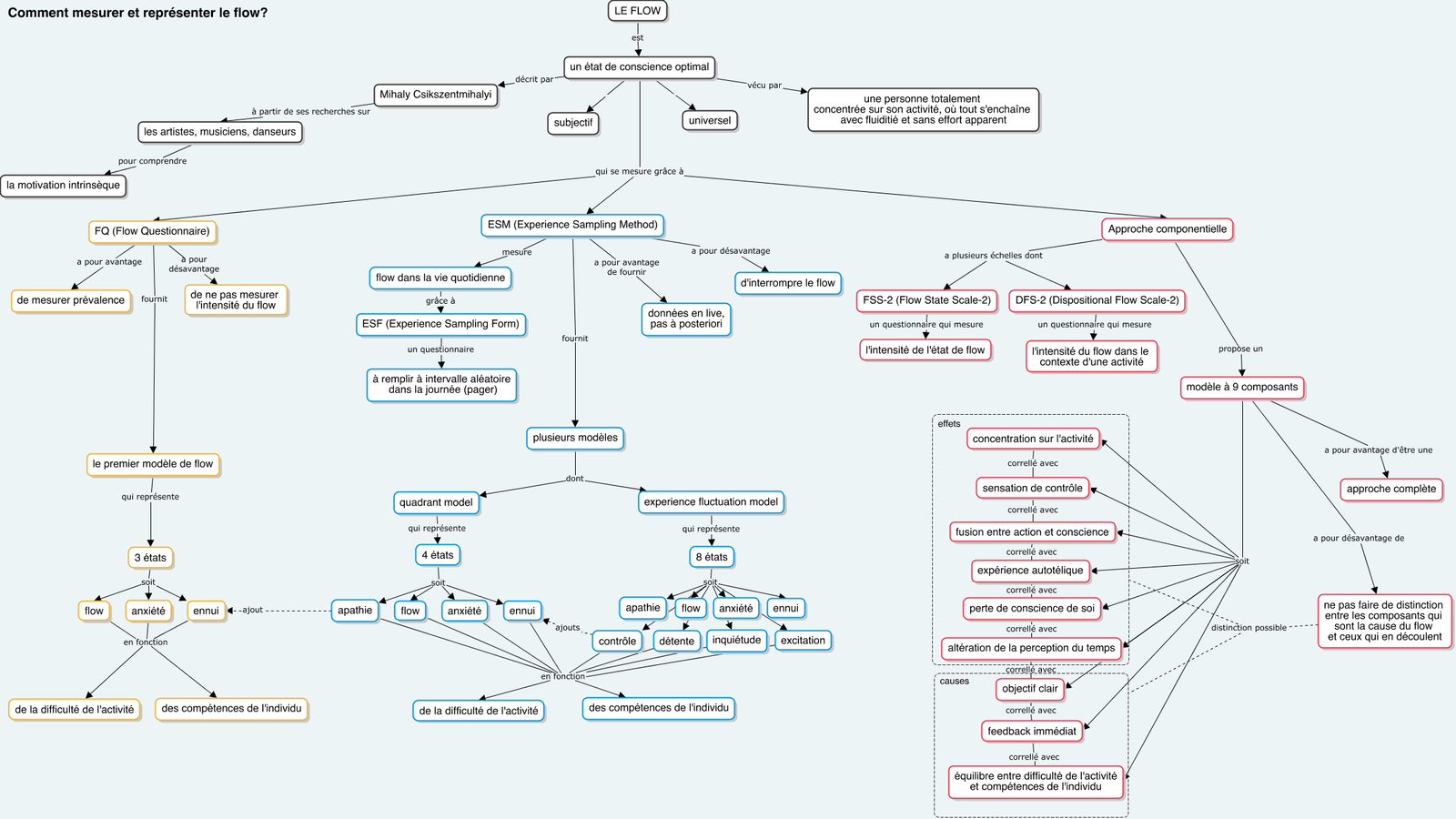« Flow/Mesurer et représenter le flow » : différence entre les versions
Aucun résumé des modifications |
(Mise à jour EduFlow2) |
||
| Ligne 11 : | Ligne 11 : | ||
Engeser, S., & Schiepe-Tiska, A. (2012). Historical Lines and an Overview of Current Research on Flow. In S. Engeser (Ed.), Advances in Flow Research (pp. 1–22). New York: Springer. | Engeser, S., & Schiepe-Tiska, A. (2012). Historical Lines and an Overview of Current Research on Flow. In S. Engeser (Ed.), Advances in Flow Research (pp. 1–22). New York: Springer. | ||
Heutte, J., | Heutte, J. (2017). L’environnement optimal d’apprentissage : contribution de la recherche empirique sur les déterminants psychologiques de l’expérience positive subjective aux sciences de l’éducation et de la formation des adultes. ''Sciences et bonheur, 2,'' .82-99. | ||
https://hal.archives-ouvertes.fr/hal-01597551/ | |||
Heutte, J., Fenouillet, F., Kaplan, J., Martin-Krumm, C., & Bachelet, R., (2016). The EduFlow model - A Contribution Toward the Study of Optimal Learning Environments. In, Harmat, L., Ørsted Andersen, Ullén, F., Wright, J.& Sadlo, G. (dir.). Flow Experience: Empirical Research and Applications (pp. 124 143). Cham, Suisse : Springer. ISBN 978-3-319-28632-7 | |||
Heutte, J., Fenouillet, F., Martin-Krumm, C., Boniwell, I., & Csikszentmihalyi, M. (2016). ''Proposal for a conceptual evolution of the flow in education (EduFlow) model.'' 8th European Conference on Positive Psychology (ECPP 2016), Angers, France. http://refa.univ-lille.fr/news/eduflow2-heutte-heutte-fenouillet-martin-krumm-boniwell-csikszentmihalyi-2016 | |||
Moneta, G. B. (2012). On the Measurement and Conceptualization of Flow. In S. Engeser (Ed.), Advances in Flow Research (pp. 23–50). New York: Springer. | Moneta, G. B. (2012). On the Measurement and Conceptualization of Flow. In S. Engeser (Ed.), Advances in Flow Research (pp. 23–50). New York: Springer. | ||
Version du 1 avril 2018 à 18:37
Créé par : User:Geneviève Donnet
Sujet traité et sources utilisées :
Le flow, décrit par le psychologue d'origine hongroise Mihaly Csikszentmihalyi dès les années 1970, est un état de conscience subjectif que l'on peut mesurer et conceptualiser de différentes manières. Cette page présente les trois approches principales pour ce faire, et les modèles conceptuels qui leur sont associés.
Ressources:
Csikszentmihalyi, M. (2014). Applications of Flow in Human Development and Education: The Collected Works of Mihaly Csikszentmihalyi. Dordrecht: Springer.
Delle Fave, A., Massimini, F., & Bassi, M. (2011). Psychological Selection and Optimal Experience Across Cultures: Social Empowerment through Personal Growth. Cross-Cultural Advancements in Positive Psychology (Vol. 2). Dordrecht: Springer.
Engeser, S., & Schiepe-Tiska, A. (2012). Historical Lines and an Overview of Current Research on Flow. In S. Engeser (Ed.), Advances in Flow Research (pp. 1–22). New York: Springer.
Heutte, J. (2017). L’environnement optimal d’apprentissage : contribution de la recherche empirique sur les déterminants psychologiques de l’expérience positive subjective aux sciences de l’éducation et de la formation des adultes. Sciences et bonheur, 2, .82-99. https://hal.archives-ouvertes.fr/hal-01597551/
Heutte, J., Fenouillet, F., Kaplan, J., Martin-Krumm, C., & Bachelet, R., (2016). The EduFlow model - A Contribution Toward the Study of Optimal Learning Environments. In, Harmat, L., Ørsted Andersen, Ullén, F., Wright, J.& Sadlo, G. (dir.). Flow Experience: Empirical Research and Applications (pp. 124 143). Cham, Suisse : Springer. ISBN 978-3-319-28632-7
Heutte, J., Fenouillet, F., Martin-Krumm, C., Boniwell, I., & Csikszentmihalyi, M. (2016). Proposal for a conceptual evolution of the flow in education (EduFlow) model. 8th European Conference on Positive Psychology (ECPP 2016), Angers, France. http://refa.univ-lille.fr/news/eduflow2-heutte-heutte-fenouillet-martin-krumm-boniwell-csikszentmihalyi-2016
Moneta, G. B. (2012). On the Measurement and Conceptualization of Flow. In S. Engeser (Ed.), Advances in Flow Research (pp. 23–50). New York: Springer.
Nakamura, J., & Csikszentmihalyi, M. (2002). The concept of flow. In The Handbook of Positive Psychology (pp. 89–105).
Carte conceptuelle
Vidéographie
